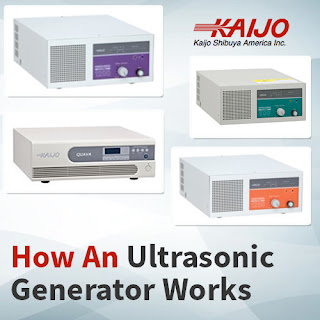The ultrasonic
generator is the
heart of an ultrasonic cleaning system. It generates the high-frequency signal,
which the ultrasonic transducers convert to sound waves of the cleaning
solution within a cleaning tank. In addition to generating the signal, the ultrasonic
generator controls the frequency and the power levels to produce several or a
range of frequencies as part of an integrated, turnkey solution or
independently to power separate transducers.
As the
sound waves go through the cleaning
liquid, the cavitation bubbles start to emerge in the low-pressure troughs of
the waves, then collapse in high-pressure peaks. This action of the microscopic
bubbles leads to a powerful scrubbing
action that helps dislodge the dirt and particles off the surfaces of parts (in the
cleaning liquid of the cleaning tank). The bubbles can even clean hard-to-reach
places like holes and crevices, leaving the item thoroughly cleaned. Ultrasonic
cleaning systems are generally considered superior to other traditional methods
that use chemicals or mechanical scrubbing.
Apart from
producing the high-quality signal, Kaijo’s ultrasonic
generators provide
the frequency needed to optimize cleaning performance for the specific cleaning
application. Setting the right frequency is the key factor for an effective
cleaning:
·
Low frequency (26 kHz to 38 kHz range) -
This frequency produces large, energetic cavitation bubbles, making them
suitable for cleaning machined parts, glass,
and wires.
·
Mid-range frequency (78 kHz to 160 kHz) -
The bubbles become smaller and the cleaning action is gentler. Suitable for
cleaning hard disk drives, solar panels,
and ceramic parts.
·
High frequency (450 kHz to 950 kHz) - The
bubbles become even smaller and the cleaning action is at its most delicate.
Suitable for cleaning semiconductors, LED's
and fragile medical components.
If an Ultrasonic generator is used with a single process to always clean the
same parts, selecting a single-frequency model is a good choice. For general-purpose
usage, where the ultrasonic cleaning system may be used in a wide variety of cleaning
applications, a generator that can produce a range of frequencies is the best
option.
Read the
complete article titled “How an Ultrasonic
Generator Works” for additional information. If you have questions, want a free
consultation or quote, contact Kaijo at 408-675-5575 or send an email to info@kaijo-shibuya.com.


No comments:
Post a Comment